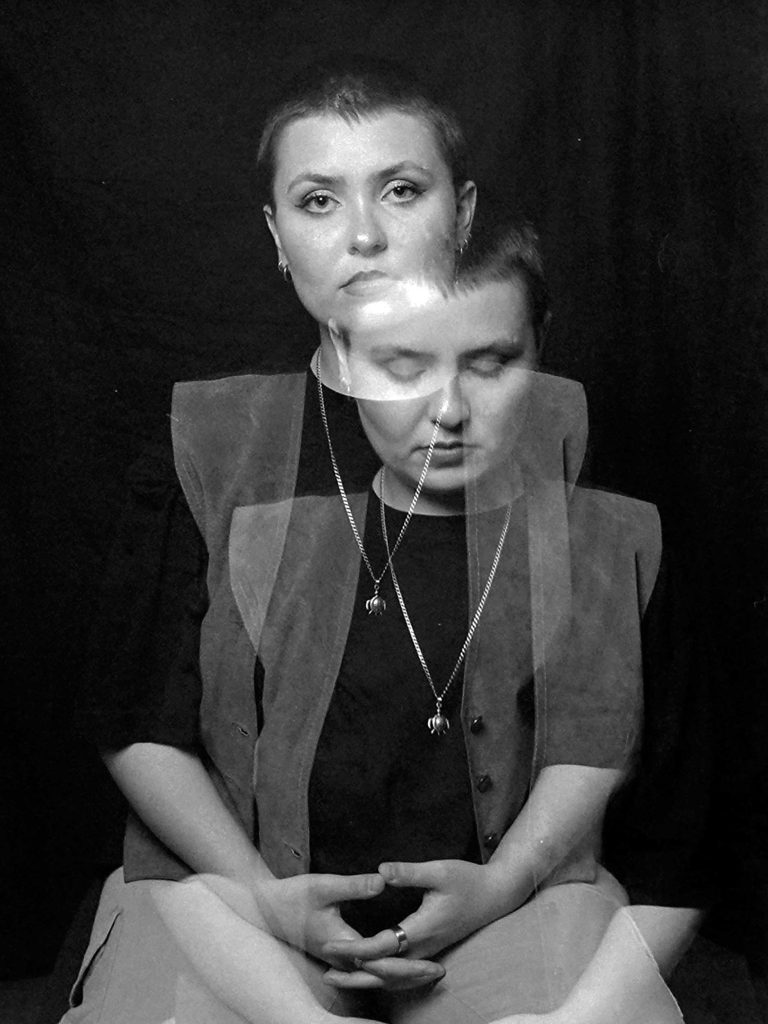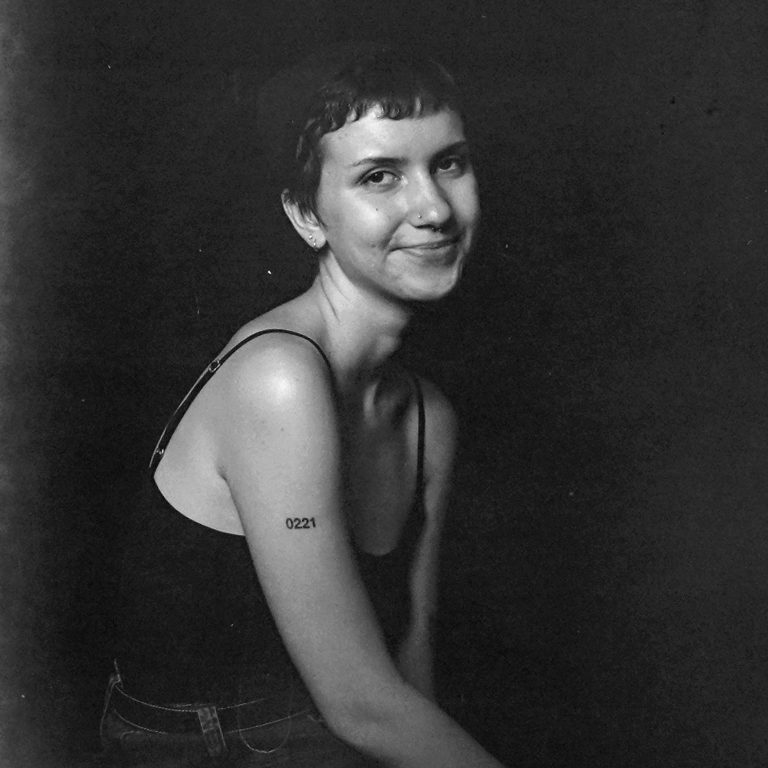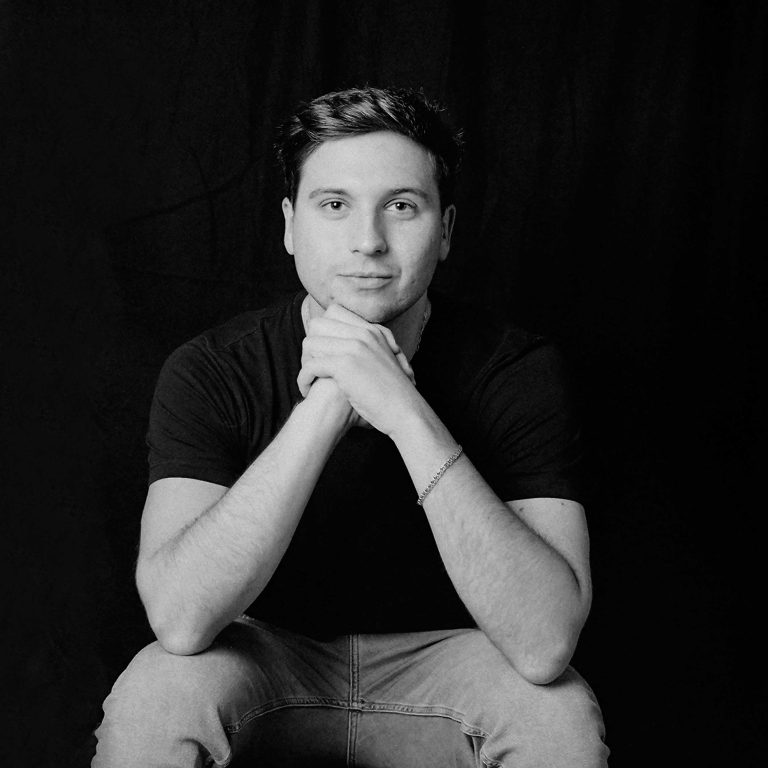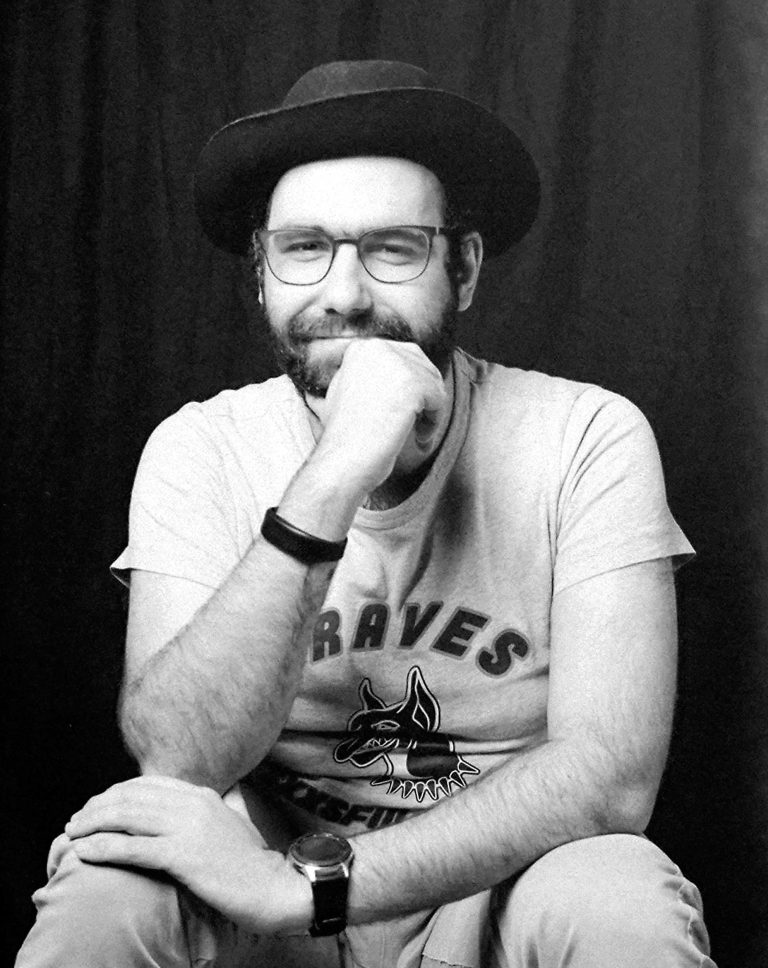GUZMI
Fragmented identities
When we talk about identity, there is a vast majority of factors we need to take into account, like culture, ethnicity, gender, costumes, physical characteristics, religious and political posture, language, sexual preference, position in the society, etcetera.
Therefore identity is not only a construct that comes from within but is also continuously influenced by exterior factors and in perpetual change.
This continuous and never-ending change can constitute a challenge for some individuals -especially when the factor migration is added to the equation- and make them wonder and doubt their own identity.
This doubting and endless changing is the base of this project, mostly parting from personal experience as a Colombian living in Germany for almost six years and also curiosity and longing to know other people’s experiences on their journeys to self-discovery.
According to the performance artist Guillermo Gómez Peña in his text En defensa del arte del performance, “The main work of art is our own body, covered by semiotic, political, ethnographic, cartographic and mythological implications”.
His affirmation makes me think about how the relationship we have with our body, how we take care of it, how we dress it, how we move it to express ourselves is directly related to our identity, how we perceive ourselves and want to be perceived by others.
I want to be able to show this on my pictures, this things that we do with our body, the expressions we make –sometimes without even noticing- the little details that sometimes others do not notice, which makes us authentic and conform our identity.
This project comes from a personal place and therefore I want all the people who will see it to sense this connection that I have and that I will create with my subjects
ERIKA

I met Erika when I was doing my internship in Cologne, she is one of the most passionate, caring and loving people I have met here. When we met for the photo sooting, we started
talking about identity and she told me she is still trying to figure out who she is and how she wants to present herself to the world. (Which I think lots of us can relate to).
Then she told me a bit more about her life before coming to Germany. It all started when her great-great-grandmother, who was born in Germany had to flee the country because of WWII and went to Kazakhstan, there she had six children, one of them being the great-grandmother of Erika, who then had her mom and last but not least Erika was born.
After the collapse of the Soviet Union, the Germans who were forced to leave their homes, had the chance to go back to Germany, so the great-great-grandmother of Erika returned to Germany, but one of the requirements for her daughter and grand-children to come to the country was to learn German.
Since Erika, her mom and Grand-mother did not learn German while growing up, the process to reunite with their family member took a bit longer. In addition to that, the law change and they were not allowed to go live in Germany anymore.
Fortunately in 2012 the late emigrants “Spätsussiedler” were allowed to go to Germany when they had proof of language knowledge.
After taking and passing the test, Erika, her mom and Great-grandmother came to Germany and started a new life, hoping for better opportunities which they could not find in Kazakhstan.
Erika went to vocational school or “Berufskolleg” (in German) where she improved her German and met some friends, there she did not feel judged and felt welcomed, since -as she tells me- everyone was coming from a migrant background, so they understood the struggles of finding themselves in a new country, learning a new culture and language. They supported each other.
Unfortunately when she went to high school she experienced discrimination from some teachers, who, instead of helping her improve and move forward, focused on the fact that her German was not perfect and made her feel like she was not enough.
She is open to talk about her struggle with depression, she tells me a part that played a role in that was the change and challenges that came with her migration journey. At
Kazakhstan she always got perfect grades and was a great student, and here she felt like she was not good enough and felt pressured to prove otherwise.
She felt pressured also because she felt all of her school mates that were born in Germany were younger than her and were already going to university, but after a lot of thinking she realized that life is not a competition, everyone has their own rhythm and she can always go study when she is ready to do it.
One last thing she tells me, and that stuck with me because that is how I feel, is that she feels thorn apart between two homes, like she is in a limbo, where she doesn´t feel hundred percent at home, either here in Germany, nor in Kazakhstan.
Maybe this is a feeling a lot of people can relate to…
ELENA

I met Elena through Erika, they have been friends for a while now and watching them laugh at each other´s jokes or silly faces is heart-warming.
Elena is a second generation immigrant, born in Cologne-Germany. Her parents came from Kazakhstan looking for a better future for their kids. When she was born they had lived here for almost ten years. At the beginning they worked in lots of mini-jobs, they both delivered newspapers in the morning and in the evening her dad delivered pizza.
After sometime, Elena’s father was able to go to school and become a plumber and open a small family plumbing business along with his two sons (who learned plumbing as well) while Elena’s mom stayed home most of the time taking care of their children and the house.
While Elena was growing up her parents wanted her to adjust to the culture and only spoke German with her (bear in mind that their German was not hundred percent perfect) so Elena had trouble adjusting at her school because people would make fun of her and her broken German.
What makes this more outrageous is that her own teacher, instead of helping her, also made fun of her in front of her entire classmates.
This was a very decisive moment in Elena’s life, the girl who was extroverted and loved to read and write, became shy and lost her passion for letters.
Nonetheless, her latent love for writing never died and one day she decided to confront her fears and wrote about her experience.
This was a cathartic experience which led her to falling in love with writing again.
I hope I get to read more of her stories and that by telling her story, she can help others who are or were in her situation.
And maybe it will reach teachers also, so they can implement some learning methods for children with migration background, to make their transition into a new culture a little bit easier.
VITALY

I met Vitaly in Cologne while I was out having lunch with some friends; he was sitting alone in the table next to ours and an elderly couple asked him if they could sit next to him (there were no free tables) and he nicely said yes, they started talking and I overheard him saying he came from Spain so I went to him, introduced myself to him in Spanish and exchanged numbers.
A couple of months went by and I talked to him about the project, and if he wanted to be part of it; he happily said yes, and we met for a coffee.
We started talking and he told me he was born in Ukraine and his parents moved to Spain when he was only four years old. They left everything they had in Ukraine and had to start their lives from zero, learning a new language and adapting to a new culture. But what they missed the most and still do is their family and friends.
I can see in his eyes that he tries to stay strong while he tells me about the part of his family who still lives in Ukraine, but his heart breaks for them, as he understands why they don’t want lo leave their homes and their lives behind but at the same time wants them to be safe and to have peace of mind.
He talks about them with love and I can feel the respect and care he has for them.
Although his experience in Germany was short, -one year- it was good. He visited a lot of places, cities close to Cologne and even a bit further away -Prague for example- he experienced the German culture and even brought a bit extra from Spain along, when his friends came to visit him.
Since he could work in english at his workplace (which is why he came to Germany in the first place), he didn’t learn lots of german, but anytime he could he would try and learn some things that would help him in his daily living.
He told me that after a year of experiencing the culture his heart was calling him home in Valencia-Spain, and he had decided that he was moving back with his mom, plus he could keep his work, so it was a win-win situation.
I feel that he and I could have been good friends, had he stayed here, but I know I have a friend who can show me around the marvellous streets of Valencia whenever I get the change to go there.
FARES

Like Elena, I met Fares through Erika, she told him about my project and he happily agreed to be a part of it.
When we first met we sat down and I told him a more about the project and a bit about myself then asked him to tell me something about himself, whatever he felt confident telling me.
He proceeded to tell me that his mom was born in Germany and when she was about eighteen or nineteen she moved to Syria, a couple of years passed and then he was born. Around 2013 -2014 he moved to Lebanon with his mom where he lived for around two years and then they moved to Cologne, looking for better opportunities for their future.
Fares has a brother and two sisters, who live in other countries, maybe he will tell me more about them sometime or maybe I will get to meet them personally someday.
I was curious as what his adjusting process was or has been like and we just started talking about the struggles of learning a new language and accommodating to a new culture and how challenging and overwhelming it all can be, but all the struggles have payed off and now he is just one year away from finishing his studies in media design.
He shows me a couple of design projects he has worked on, which seem to me like they were taken out of a science-fiction or fantasy movie – maybe he will show them publicly someday-.
I ask him about his social life and if he has had troubles making friends- which is my case- , he tells me is not that he finds it difficult to make friends but that he is not much the partying type and prefers to stay at home and watch a movie or read something. This is fun to me because I also feel like that sometimes, but maybe it is something lots of us can relate to…